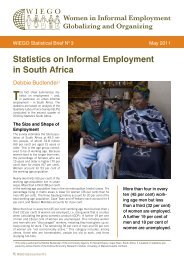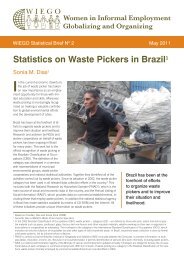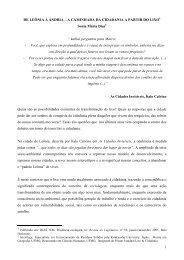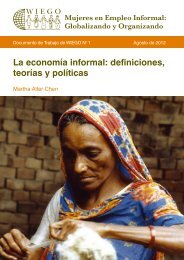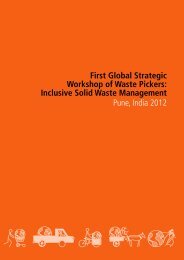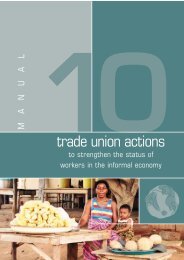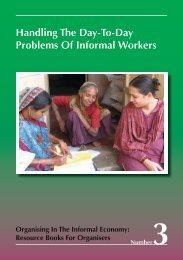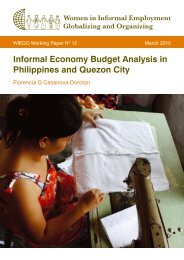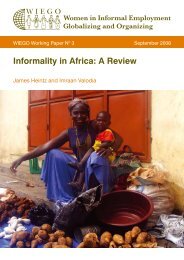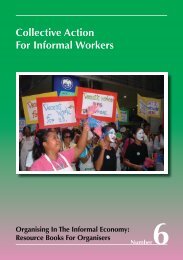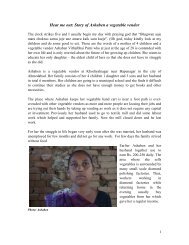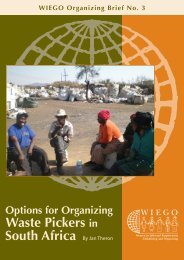Organizing on the Streets: A Study of Reclaimers in ... - Inclusive Cities
Organizing on the Streets: A Study of Reclaimers in ... - Inclusive Cities
Organizing on the Streets: A Study of Reclaimers in ... - Inclusive Cities
- No tags were found...
You also want an ePaper? Increase the reach of your titles
YUMPU automatically turns print PDFs into web optimized ePapers that Google loves.
<str<strong>on</strong>g>Organiz<strong>in</strong>g</str<strong>on</strong>g> <strong>on</strong> <strong>the</strong> <strong>Streets</strong>: A <strong>Study</strong> <strong>of</strong> <strong>Reclaimers</strong> <strong>in</strong> <strong>the</strong> <strong>Streets</strong> <strong>of</strong> Cape Townbe<strong>in</strong>g “nice to <strong>the</strong>m”, as <strong>on</strong>e reclaimer put it, “regulars”, especially sell<strong>in</strong>g paper and plastics, are<strong>of</strong>ten exempted by buy-back centres from <strong>the</strong> rule that identity documentati<strong>on</strong> must be shown ateach <strong>in</strong>teracti<strong>on</strong> to be able to sell to <strong>the</strong> centres. This is a huge impediment <strong>on</strong> reclaimers’ sell<strong>in</strong>gdays and we met people wait<strong>in</strong>g outside for friends to arrive whom <strong>the</strong>y could trust to do <strong>the</strong>irsell<strong>in</strong>g for <strong>the</strong>m as <strong>the</strong>y were without identity documents.As regards <strong>the</strong> questi<strong>on</strong> <strong>of</strong> whe<strong>the</strong>r reclaimers saw <strong>the</strong>mselves as workers <strong>the</strong>re were <strong>in</strong>terest<strong>in</strong>gresp<strong>on</strong>ses. In many cases people c<strong>on</strong>t<strong>in</strong>ually referred to a time when <strong>the</strong>y were formally employedwhen answer<strong>in</strong>g questi<strong>on</strong>s about <strong>the</strong>ir work:“I was a worker before, worked <strong>in</strong> Athl<strong>on</strong>e at Sunnyset as a labourer. I lost my job 3 or 4years ago and so I do this. I have been liv<strong>in</strong>g outside <strong>on</strong> <strong>the</strong> street <strong>in</strong> Observatory for 6 or7 years, said David*. Major* from Mowbray told us that he sees what he does as wast<strong>in</strong>gtime “because I do not call it a job, but just collect<strong>in</strong>g for a liv<strong>in</strong>g.” James* said “I have beendo<strong>in</strong>g this s<strong>in</strong>ce 2004 when <strong>the</strong>re was no work, and <strong>the</strong>n I do it (skarrel). If I have work, <strong>the</strong>nI go and work (and wash cars).”A few reclaimers however repudiated Major’s answer: “I am a worker because I go out everymorn<strong>in</strong>g like any ord<strong>in</strong>ary worker. I d<strong>on</strong>’t say I go to skarrel but I go to work. It is h<strong>on</strong>est liv<strong>in</strong>g,<strong>the</strong>refore it is work.” Many stressed how <strong>the</strong>y worked hard, were self-starters, and were do<strong>in</strong>gh<strong>on</strong>est work. Marcus* said “It’s an h<strong>on</strong>est liv<strong>in</strong>g; a hard day’s work.” Similarly Bens<strong>on</strong>* said “I d<strong>on</strong>ot steal or break houses. It is an h<strong>on</strong>est liv<strong>in</strong>g.”Many regarded reclaim<strong>in</strong>g as work while very few saw it as a bus<strong>in</strong>ess. Most importantly,<strong>the</strong>y regard reclaim<strong>in</strong>g as someth<strong>in</strong>g that feeds <strong>the</strong>ir families. They also shared with us how ahandful <strong>of</strong> people disregard <strong>the</strong>m because <strong>the</strong>y reclaim waste. They claimed that <strong>the</strong>y are calledderogatory names such as “bergies”. A woman from Langa said that <strong>the</strong> people <strong>in</strong> <strong>the</strong> area call<strong>the</strong>m “Mabuyaze” (i.e. “come back with noth<strong>in</strong>g”). She said this is how people refer to <strong>the</strong>m but<strong>the</strong>y could not give up <strong>on</strong> <strong>the</strong> project because it is <strong>the</strong>ir <strong>on</strong>ly source <strong>of</strong> <strong>in</strong>come.Interest<strong>in</strong>gly enough some said that <strong>the</strong>y feel a sense <strong>of</strong> respect and acknowledgement fromcommunities <strong>in</strong> which <strong>the</strong>y reclaim. They have found communities to be very sympa<strong>the</strong>tic andhelpful by <strong>of</strong>fer<strong>in</strong>g <strong>the</strong>m valuable goods for recycl<strong>in</strong>g. One <strong>of</strong> <strong>the</strong> elders noted, “These people are<strong>in</strong>directly workers <strong>of</strong> <strong>the</strong>se buy-back centres, work<strong>in</strong>g under harsh c<strong>on</strong>diti<strong>on</strong>s and without anyacknowledgement and benefits afforded to <strong>the</strong>m”. He views <strong>the</strong> c<strong>on</strong>duct <strong>of</strong> buy-back centres as<strong>in</strong>humane and exploitative even to <strong>the</strong>ir own workers. “These Boers are just c<strong>on</strong>cerned about <strong>the</strong>irown families while reclaimers are work<strong>in</strong>g under harsh c<strong>on</strong>diti<strong>on</strong>s to enrich an <strong>in</strong>dividual <strong>in</strong>stead<strong>of</strong> <strong>the</strong> poor communities <strong>the</strong>y come from.”6.3 How Work is OrganizedOf those people <strong>in</strong>terviewed, <strong>the</strong>re was almost a 50/50 split as regards whe<strong>the</strong>r reclaimers worked<strong>in</strong>dividually or <strong>in</strong> some form <strong>of</strong> collaborati<strong>on</strong>. A Uni-Scrap worker said that most reclaimers comeas groups <strong>of</strong> friends or couples. The Uni-Scrap workers claimed that reclaimers share <strong>the</strong> proceeds.Although <strong>the</strong> m<strong>on</strong>ey is sometimes shared unequally it is very rare to see <strong>the</strong>m fight<strong>in</strong>g over <strong>the</strong>proceeds. This echoed what reclaimers <strong>the</strong>mselves had expla<strong>in</strong>ed, that pr<strong>of</strong>its are shared equally.<strong>Reclaimers</strong> also organize <strong>the</strong>ir work accord<strong>in</strong>g to strategic days, times, places, and prices. Sixpeople spoke about municipal collecti<strong>on</strong> days. Two spoke <strong>of</strong> key times and relati<strong>on</strong>ships withresidents, where those residents trust <strong>the</strong>m, and <strong>the</strong>y are <strong>in</strong>vited by residents to take from <strong>the</strong>irrefuse b<strong>in</strong>s, also sometimes be<strong>in</strong>g given food.One reclaimer starts work<strong>in</strong>g from six o’clock <strong>in</strong> <strong>the</strong> morn<strong>in</strong>g and relaxes for a few hours <strong>in</strong> <strong>the</strong>afterno<strong>on</strong>. He <strong>the</strong>n starts work<strong>in</strong>g aga<strong>in</strong> from five o’ clock <strong>in</strong> <strong>the</strong> even<strong>in</strong>g when <strong>the</strong> home-ownershave returned from work, and takes <strong>the</strong> reclaimed items to <strong>the</strong> scrap yard <strong>the</strong> follow<strong>in</strong>g day. Shaik*said that he planned his work <strong>in</strong> advance, and Stanley* claimed that <strong>the</strong>re are known early-birds.13




